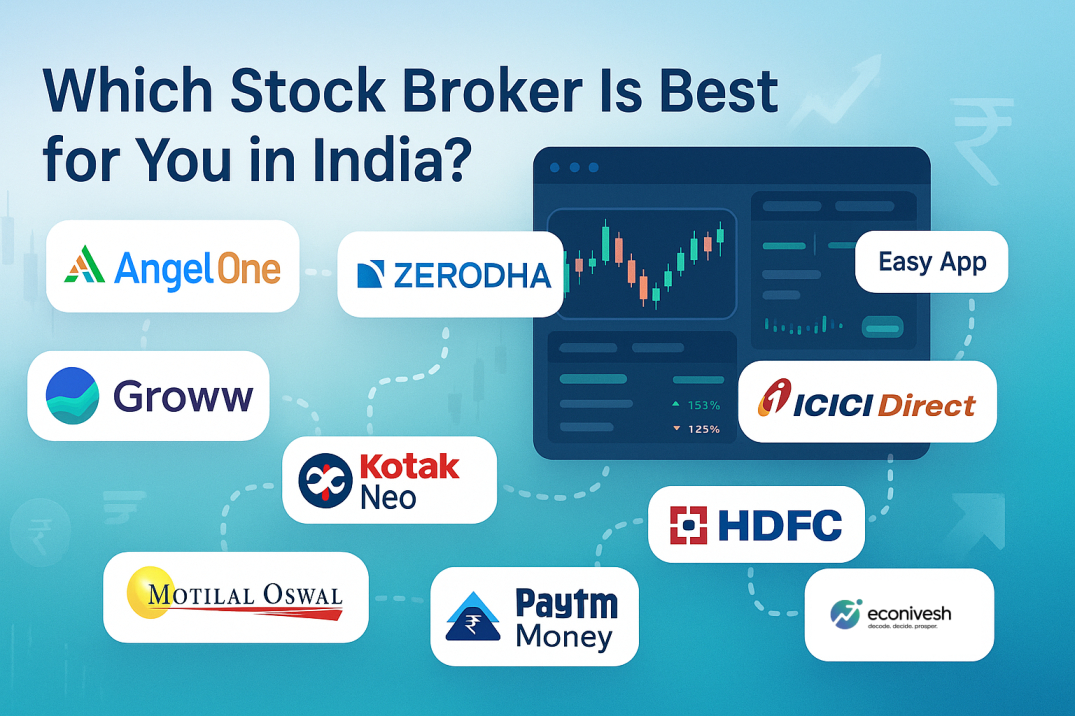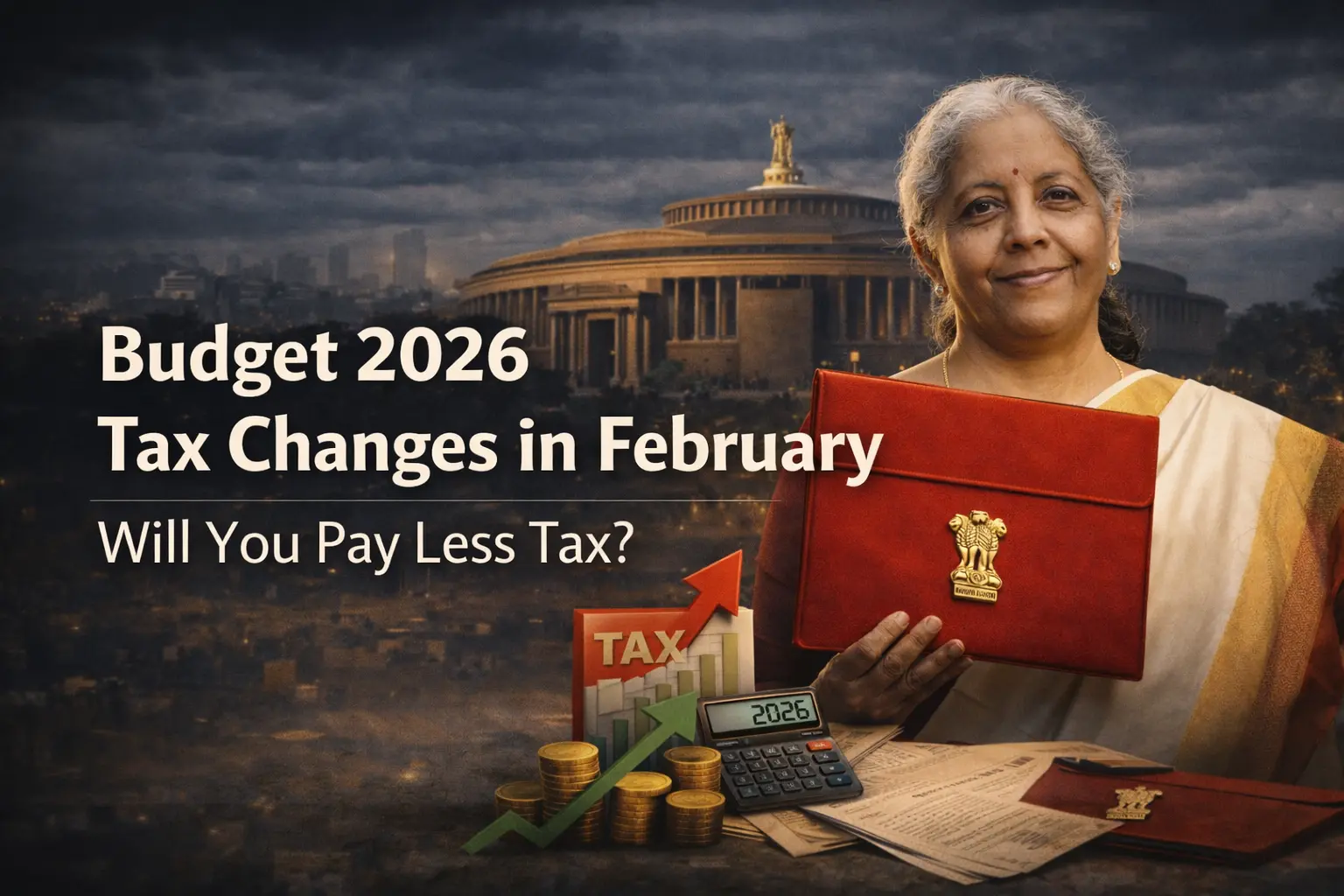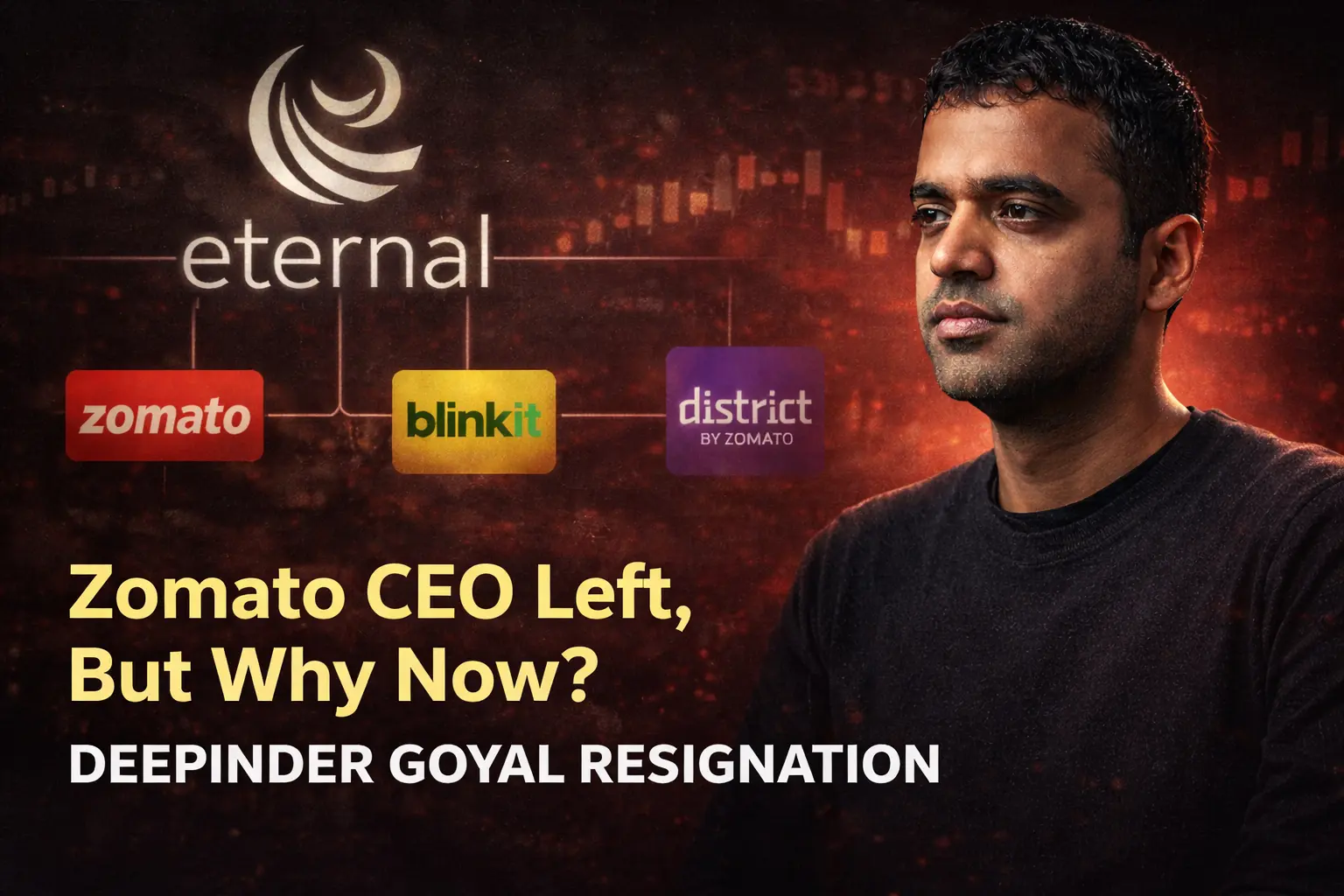Selecting the best stockbroker is more important than ever in India, where investing is quickly moving online. Your broker affects both your profits and peace of mind, regardless of whether you’re a professional researching stocks, a student beginning SIPs, or an F&O trader. The fact that millions of people continue to look for the “best stockbroker” or “cheapest brokerage in India” demonstrates how difficult this decision can be. With straightforward, India-focused comparisons of Zerodha, Upstox, Groww, Angel One, and more—explained without jargon—this guide breaks through the clutter.
What is a Stockbroker and Why Does it Matter?
On reputable exchanges such as the NSE and BSE, stockbrokers are SEBI-registered intermediaries that assist traders and investors in buying and selling shares, derivatives, mutual funds, exchange-traded funds, and other products. Whether you’re a professional applying for an IPO, a student beginning SIPs, or an investor in options and futures trading, you need a trustworthy broker. Opening an account, completing KYC, and trading are made easy by the mobile-first interfaces of the majority of brokers, such as Groww, Upstox Pro, and Zerodha Kite, as well as Angel One. Discount brokers, the newest trend, provide flat brokerage, zero AMC demat accounts, and reasonably priced investment options for all. Consider a stockbroker that puts you in direct contact with the market, such as Zomato.
Table of Contents
Why Comparing Stockbrokers Matters
- Charges impact profits (brokerage, AMC, transfer fees)
- Safety of funds and shares
- Trading platform speed & reliability
- Customer support during market volatility
- Research tools and advisory services
How to compare stockbrokers – A simple framework
Breaking the process down into a few easy phases and pillars makes selecting the correct broker easier. Prior to making a choice, use this checklist:
Costs & Charges
Brokerage and fees directly cut into your profits. Compare delivery, intraday, and F&O charges along with demat AMC and hidden costs. Many discount brokers offer a flat ₹20 per order and zero delivery brokerage, but always check for extra fees like call & trade or platform charges.
Platforms & Experience
Your broker’s app and platform shape your trading journey. Beginners need simple, clutter-free apps, while active traders depend on speed, stability, and advanced tools. Always check reliability before opening an account.
Safety & Regulation
Always pick an NSE- and BSE-connected broker who is registered with SEBI. This guarantees that, under regulatory supervision, your money and stock stay secure. A reliable, compliant broker shields you from needless danger.
Support & Service
Good customer service can come in handy when the market is volatile or there are technological issues. Choose a broker who is known for providing prompt, dependable service via chat, phone, or email, so you are never trapped when timing is critical.
Extra Features & Value-Add
Beyond low brokerage and good platforms, many brokers now compete with extra benefits like zero AMC demat accounts, instant UPI deposits, IPO and mutual fund access, research tools, and even free learning resources. These value-adds make trading not only smoother but also more profitable and convenient for investors at every level.
Who is India’s No 1 Stockbroker?
When investors ask, “Who is India’s No. 1 stockbroker?” The answer depends on how you measure it—lowest brokerage, active clients, or features. Zerodha dominates in client base and low-cost trades, Upstox is known for its advanced trading platforms, Groww has captured beginners moving from mutual funds, and Angel One blends research and discount pricing. Each broker is a leader in its own category.
Zerodha – India’s pioneer in discount broking
Zerodha, India’s largest trading company with over 10 million active clients, has transformed the market with the introduction of negotiation broking. With no brokerage fees for equity delivery and a fixed fee of ₹20 per trade for intraday and F&O, it’s highly affordable. Intuitive, fast, and easy to use, its core Kite platform is ideal for both newcomers to SIPs and experienced traders looking for a reliable resource. The combination of trust, affordable pricing, and simple design has made Zerodha a market leader in a short time, leaving competitors struggling.
Upstox – Low-cost trading with advanced tools
Ratan Tata is a backer of Upstox, a discounted-priced broker known for its technology-driven methodology and pricing and one of the fastest-growing brokers in India. With free equity delivery and a fixed fee of ₹20 per trade across intraday and F&O, it keeps costs low for investors. Its flagship program, Upstox Pro, is fast, beautiful, and feature-rich, with watchlists, advanced graphing, and seamless order execution. This user-friendly platform is suitable for both novice traders starting out on a small scale and experienced traders needing reliable, affordable tools.
Groww – From mutual funds to stock broking
Groww, which initially made its mark in the Indian stock market as a mutual fund platform, then branched out into stockbroking and emerged as one of the fastest-growing brokers in India. It is known for its clean, fast, and user-friendly mobile app; a flat rate of ₹20 per trade for stocks and F&O; and zero commission on mutual funds. For millions of new investors in India, Groww has made investing easy and accessible with features like UPI deposits and instant account opening, significantly simplifying the investment process.
Angel One – Full-service meets discount pricing
Angel One (earlier Angel Broking) stands out by merging full-service capabilities with discount pricing. Investors get the best of both worlds—a flat ₹20 per trade brokerage plus access to research reports, advisory tools, IPOs, mutual funds, and a strong support network. Its modern Angel One app makes trading simple for beginners, while its in-depth research and product range attract experienced investors.
Other brokers worth considering
In addition to these four companies, such as Angel One, Groww, Zerodha, and Upstox, other companies with distinct presences in the Indian stock market include Paytm Money, Motilal Oswal, Kotak Neo, ICICI Direct, and even HDFC Securities, which are potential options for investors. They can consider any of these if they meet their needs. With their zero-brokerage or flat-fee business models, both Kotak Neo and Paytm Money appeal to cost-conscious, digital-first consumers. Bank-backed platforms like HDFC Securities and ICICI Direct offer trust, integrated accounts, and in-depth research. Motilal Oswal is known for its effective expert-driven and advisory strategies. Combined, these options offer investors flexibility, whether they prefer a reliable banking platform, affordable apps, or full-service advisory support.
Charges and costs – What you really pay
When investors ask, “Who is the best stockbroker in India with charges?” or “Who charges the lowest brokerage in India?” the reality is that costs include more than brokerage. Expect:
- Brokerage fees—A flat ₹20 per order is common among discount brokers.
- Demat AMC – Annual charges for holding shares.
- Many search “Which broker has zero AMC charges?”
- Regulatory charges – STT, SEBI turnover fee, GST.
- Transfer charges—Investors often ask, “What are the charges for share transfer in Zerodha?” or “How to move stocks from one broker to another?” Fees vary from ₹25 to ₹100 per transfer depending on the broker.
Understanding the full cost picture is key to choosing the cheapest brokerage in India for your profile.
Safety, regulation, and trust
Investor concerns such as “Is Zerodha safe for trading?” and “Who is the biggest stockbroker?” are valid. All major brokers mentioned here are SEBI-registered stockbrokers and tied to depositories (NSDL/CDSL). Always check the broker’s SEBI registration number for assurance.
Stockbroker FAQs in India: Top Queries Answered
Who is the No 1 stockbroker in India?
According to SEBI data, Zerodha has the most active clients and is the top stockbroker in India. Groww has been expanding quickly, though, and is almost catching up in terms of new retail investors.
Which is the cheapest brokerage in India?
Discount brokers like Zerodha, Upstox, Groww, and Angel One offer the cheapest brokerage in India—a flat ₹20 per trade on intraday and F&O, while delivery-based investing is often free.
What is the minimum balance for Demat account?
Most modern brokers, such as Groww, Zerodha, and Upstox, require no minimum balance for a Demat account, making them beginner-friendly.
Which is the biggest stockbroker in India?
By client base, Zerodha is currently the biggest broker in India. By growth rate, Groww is the fastest-growing broker among retail investors.
How to buy stocks without a broker in India?
Without a broker registered with SEBI, you are unable to purchase stock directly from the NSE or BSE. However, you can use ASBA to invest in government bonds, small savings plans, or initial public offerings (IPOs) without the need for brokers.
How many Demat accounts can one open?
You can open multiple Demat accounts with different brokers using the same PAN card. There is no legal limit, but each account will have separate KYC and charges.
Is Zerodha safe for trading?
Yes, Zerodha is SEBI-registered and an NSDL/CDSL depository participant, making it safe. Your stocks and funds remain in your Demat account, not with the broker.
Is Zerodha RBI approved?
No, RBI does not regulate brokers. Stockbrokers are regulated by SEBI. Zerodha is fully SEBI-registered and compliant with Indian market regulations.
Which broker has zero AMC charges?
Groww and Zerodha (BSDA accounts) often provide zero annual maintenance charges. Some others, like Paytm Money, also run zero AMC offers. Always check the latest broker policy.
How to compare stockbrokers in India?
Compare brokers by costs, platform experience, safety, support, and extra features like IPO access or research tools.
How did Groww overtake Zerodha?
Groww’s focus on an easy-to-use, user-friendly layout, zero AMC accounts, & luring new investors with straightforward stock and mutual fund investing helped them overtake Zerodha.
Who owns Angel One, Zerodha and Groww?
Angel One was founded in 1987 by Dinesh D. Thakkar, originally as Angel Broking.
Zerodha was founded in 2010 by Nithin Kamath and Nikhil Kamath.
Groww is owned by Nextbillion Technology Pvt. Ltd., founded in 2016 by ex-Flipkart employees Lalit Keshre, Harsh Jain, Ishan Bansal, and Neeraj Singh.
Conclusion
Choose the best stockbroker in India for your needs., not the “best” one. Groww is easy to use if you’re just starting out; Zerodha and Upstox are good choices if you want sophisticated charts and cheap trading; full-service brokers like ICICI Direct and Angel One are reliable for research and advice; and you can always have multiple Demat accounts, test out different brokers, and eventually decide who should be responsible for managing your long-term assets.








